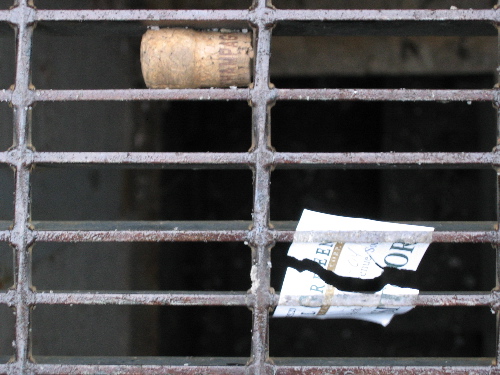January 24, 2004
REACTION SQUAD

After seeing American Splendor a few weeks ago and being underwhelmed by the subject, I sent a typically hot-headed and ill-considered email to Douglas Wolk, because he knows more about comics than The Yellow Kid himself. (I love George Herriman and Chris Ware, and when my friends got stoned in high school, we'd pull out Zap comix. That's the extent of my comix knowledge. And Pedro Bell, who I hate. You don't have to love those shitty album covers to love P-Funk.) My question went something like "Why do people care about this 'tard? His reviews seem like passable liner notes for Collectables reissues and his stories are known only because R. Crumb illustrated them. I can't see any other reason." Well, I suggested a reason, and Douglas kindly responded:
"Hi Sasha--
So I'm not the biggest fan of Harvey Pekar's stuff, though I like a lot of it okay--I didn't love the movie, either. But the idea that "he's an absolute sham, and part of the 80s 'laugh at the average guy' irony fest" doesn't really make sense to me. I'm not sure what he's supposed to be shamming, and he's laughing at the "average guy" from what perspective? If anything, it's the perspective of being one, pretty much, at least in terms of class: here's somebody who worked as a file clerk at a VA hospital for decades--not something people tend to do ironically--and read a lot, and thought it'd be interesting to document his life mostly in terms of its quotidian parts rather than its dramatic points, and then to get those refracted through a bunch of different artists' ways of showing his life: sort of autobiography, but partly removed from his control.
The other people in Pekar's comics are sometimes broadly caricatured, sometimes in unflattering ways (Mr. Boats comes to mind), but I'm willing to cut him lots of slack for that, since nobody gets it quite as hard as Pekar himself does--again, he mostly avoids peaks & chasms, but he shows himself mostly in a vaguely unflattering light. (If I'm remembering correctly, which I might not be, part of the reason he dissed "Maus" was that Art Spiegelman had been much more disrespectful in depicting his father than himself.)
Maybe the part where the irony-fest comes in was his appearances on Letterman, whose attitude toward him was pretty condescending. (Pekar's attitude, as far as I can tell, was that he was willing to take Letterman's smirks, because there's no such thing as bad publicity when you're trying to sell something self-published, but that he wasn't going to shut up if he wanted to talk about GE.) But I don't think too many people read it for the "oh look at the ordinary guy!!" factor; when I was working in a comics store in mid-Michigan in the mid-'80s, most of the people who bought it liked that it was thoughtful and different from everything else in the store and had some medium-to-big-name cartoonists contributing to it. (The fact that Crumb drew part of the early issues--starting in 1976, incidentally--is probably the only reason he was able to get any attention at all for them.)
That's also part of why Pekar's stuff hasn't been so interesting to me in the past few years. When you're doing quasi-realist autobiographical comics and everything else in the store is either "Dr. Strange" or "The Fabulous Furry Freak Bros.," that niche belongs to you; when you have to compete with David B. and Marjane Satrapi and Chester Brown and Joe Matt, things are tougher.
Anyway. Thanks for asking me to play Shana Alexander; here's a kind of interesting piece about Pekar and the movie."
I put irony on the consumer, for what it's worth. I am sure Harvey is unironic about what he does. That doesn't mean it's any good, but I am sure he means it.
Posted by Sasha at January 24, 2004 09:35 PM | TrackBack